CBD for Sleep and Insomnia: How Cannabidiol Can Help Reset Your Sleep Cycle
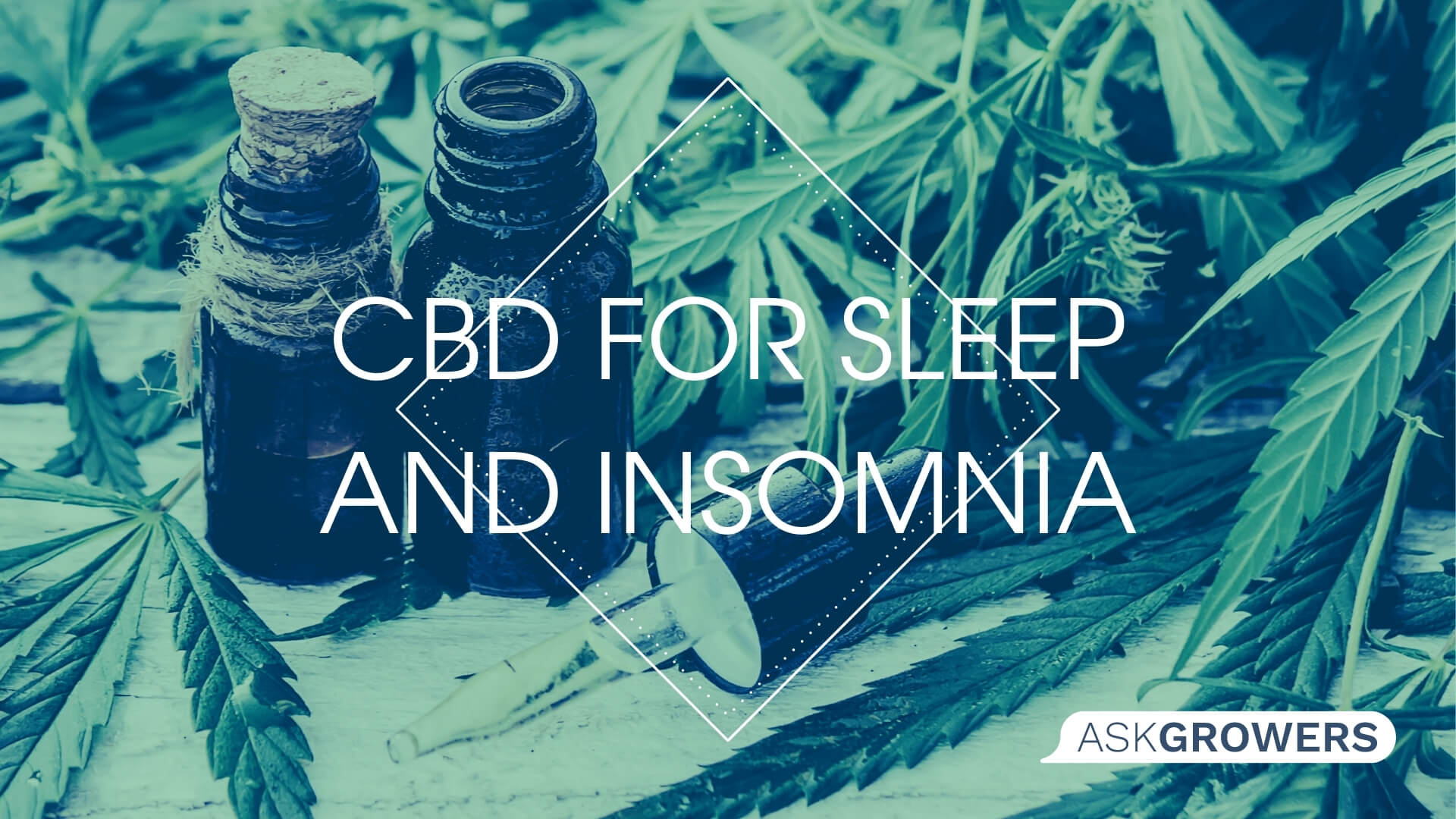
The American Psychiatric Association states that insomnia is one of the most common sleep disorders. Individuals are diagnosed with insomnia if they experience sleep issues at least three nights a week throughout three months. Patients with this ailment meet challenges in falling asleep, staying asleep, or both, and they do not feel refreshed when waking up. This can have significant negative consequences for their life quality due to chronic fatigue. The inability to fall asleep or stay asleep affects their daily functioning and leads to major difficulties in their lives.
There are 2 types of treatment for insomnia: pharmaceutical and non-pharmaceutical. Regarding a non-pharmaceutical approach, it is recommended to avoid caffeinated beverages, use electronic devices at night, and exercise before bedtime because these activities interfere with an ability to fall asleep. The medication approach in insomnia treatment is typically associated with long-term side effects caused by prescription sleep aid in the form of medicines.
However, there is incipient research indicating that cannabidiol (or CBD) helps cure insomnia and has fewer or no side effects. CBD is one of the cannabinoid compounds present in cannabis plants. Industrial hemp contains a high concentration of cannabidiol. Companies that manufacture and sell CBD-infused products offer a variety of choices such as hemp oil, pills, capsules, edibles, topicals, and many more. These goods don’t contain any psychoactive compounds like tetrahydrocannabinol (THC) and cannot alter consumers’ consciousness making them feel high, which is associated with marijuana treatment or cannabis oil use.
Read Also: How Does CBD Work
Medical Research
The 2021 statistics shows that more than one-third of adult individuals in the United States experience insomnia symptoms in their life, while up to 10% of these cases are severe enough to reach a diagnosis of insomnia. Mayo Clinic states that insomnia may be caused by different mental health problems and diseases, such as anxiety, post-traumatic stress disorder (PTSD), and depression.
Although research is still in its infancy, there are several studies that suggest that cannabidiol helps treat the causes of insomnia. Early studies conducted in 1981 by E. A. Carlini and J. M. Cunha and based on clinical evidence showed sleep improvements in insomniacs after CBD use.
The study held in 2019 and published in The Permanente Journal demonstrated a CBD impact on sleep quality and anxiety reduction. Out of 72 participants, 47 individuals suffered from anxiety as a primary sleep concern, while 25 people had sleep difficulties. They were given 25 mg CBD as capsules daily. The study concluded that most patients experienced a reduction in anxiety levels at the first-month mark, while almost 66% of them reported improved sleep quality. Cannabidiol works for eliminating the negative effects of a high cortisol level which typically increases as the body’s response to stress.
Scott Shannon, M.D. published his study in 2016 on the effectiveness of CBD oil for pediatric insomnia and anxiety as secondary symptoms of PTSD.
The 2019 study published in The Journal of Alternative and Complementary Medicine proved the improvement of sleep quality in 38% of PTSD patients.
Chronic pain may also cause insomnia and be treated by CBD. There are numerous studies to conclude that CBD relieves pain. The authors highlight that CBD can help with sleep quality and insomnia by reducing pain. The results are impressive compared to the health condition of the participants who were given a placebo.
The 2018 review published in Frontiers in Pharmacology described a trial held with 27 healthy volunteers who received CBD over 2 nights. The substance didn’t affect their normal sleep cycles.
Read Also: The Risks and Benefits of Using Vape Juice for Anxiety Relief
How CBD Might Help with Sleep
There are several medical studies concluding that CBD allows getting a good night’s sleep. Researchers do not explicitly state how it happens, but they discovered that CBD is able to affect the endocannabinoid system in humans. This system is known to regulate circadian rhythms and maintain certain body functions, such as sleep and mood.
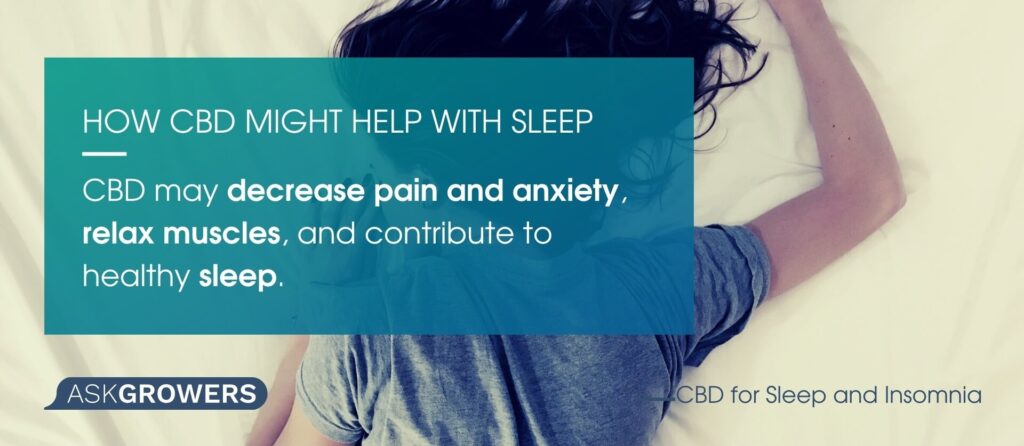
In the central nervous system and brain, there is a network of cannabinoid receptors. Cannabinoid CBD can attach to the brain cells and proteins and affect a sleep/wake cycle interacting with these receptors. CBD may decrease pain and anxiety, relax muscles, and contribute to healthy sleep. More research is required to draw a clear picture of the underlying processes; however, it is certain that CBD is a great aid when it comes to muscle relaxation and to make someone sleepy. Research shows that when a person feels calmer, it leads to a more peaceful and refreshing night’s sleep and improves sleep quality.
The study conducted in 2006 proves that CBD decreases rapid eye movement (REM) sleep capacity and frequency of periods when people awake during the night. (REM sleep is a sleep phase when dreaming occurs.) Also, CBD increases wakefulness by inducing a release of dopamines, neurotransmitters that are responsible for waking-related areas in the human brain.
How to Use CBD for Sleep
CBD may come in different forms suitable for varied needs and preferences. CBD gummies, oil, vape concentrates, capsules, pills, and tinctures are now available on the market. . Vaping is the quickest method to ingest CBD, but it has limited research and may come with increased respiratory risks.
How much CBD is required to cope with poor sleep? The amount of CBD that should be taken to help people sleep depends on many factors, such as weight, the severity of symptoms, and one’s personal body chemistry. In most studies, participants were given daily CBD doses of 25 mg. Patients with anxiety problems had CBD capsules every morning, while individuals diagnosed with sleep issues received the dosing every evening. This dose was enough for an adequate clinical response.
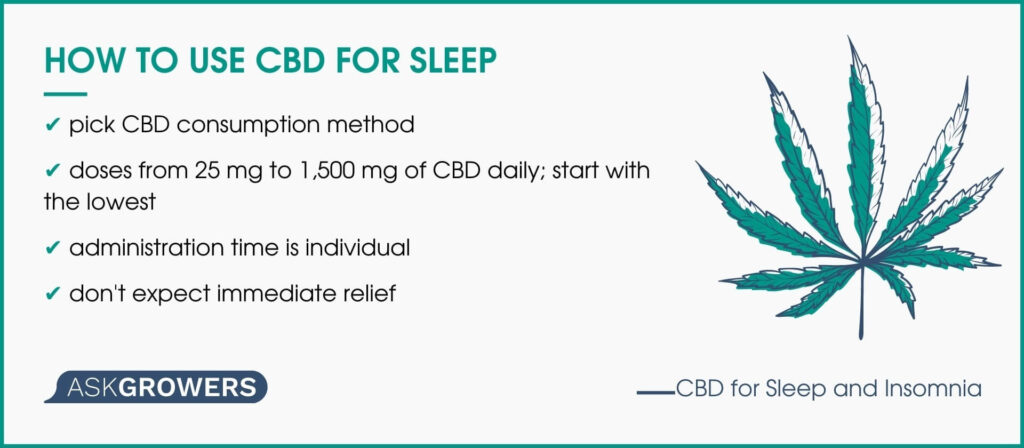
Single patients with severe, debilitating diseases were given 50-75 mg of CBD daily. In one case, a patient with a serious schizoaffective disorder received an increased dosage of 175 mg.
There are studies in the clinical literature that report the use of 300-600 mg of CBD daily, but this treatment method doesn't seem expedient regarding the retail cost of CBD. However, even long-term use doesn’t create toxic effects of CBD on patients, and a 1500 mg dose can be well tolerated by users. There were no reports of lethal overdose.
When it comes to the dosage for sleep, it is best to start with the lowest one and increase it as needed, based on one’s specific symptoms. The administration time is individual, too.
An important aspect to consider is that many of the studies did not show an immediate relief. Most of them report a period of approximately one month until there were noticeable differences in sleep quality.
Benefits and Side Effects
People with trouble sleeping get multiple benefits from CBD consumption. As clinical trials show, their sleep scores improve, anxiety and stress decrease, and nightmares reduce. They have less dream recall. In addition to helping people with sleep issues, CBD is also used for the treatment of various neuropsychiatric disorders.
CBD is well tolerated by users, and they are unlikely to experience any serious adverse effects. Clinical practice shows that negative reactions may occur in elderly individuals and patients with accompanying medical conditions.
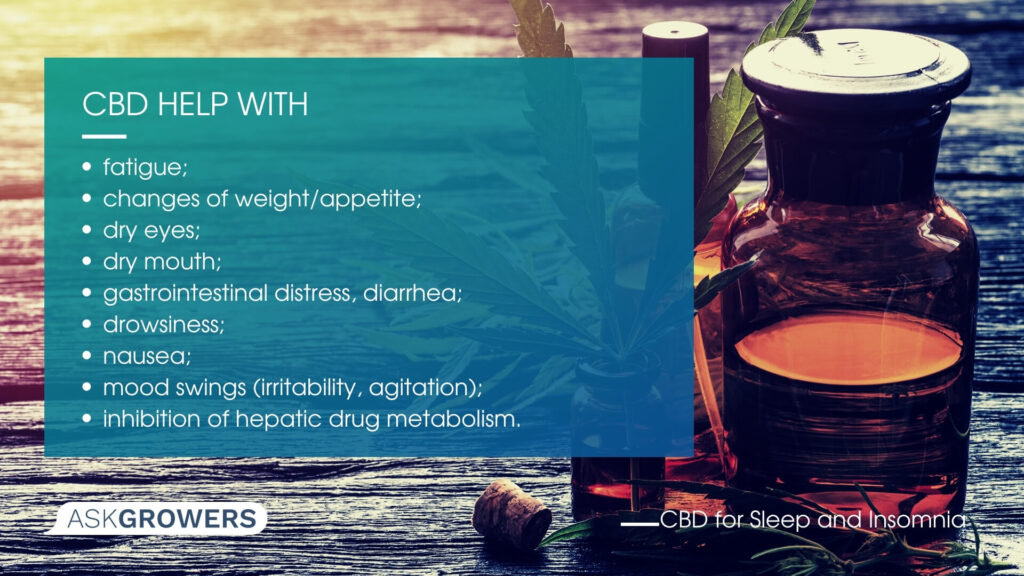
As any potent substance, CBD has its pros and cons, occasionally inducing:
- fatigue;
- changes of weight/appetite;
- dry eyes;
- dry mouth;
- gastrointestinal distress, diarrhea;
- drowsiness;
- nausea;
- mood swings (irritability, agitation);
- inhibition of hepatic drug metabolism.
If you are already taking other medicines, avoid self-medication because of possible drug interactions. Some medications can cause reduced CBD bioavailability, while others can affect CBD metabolism and stimulate its accumulation in the body in high doses. Stop using this substance if any negative reactions occur. Keep in mind that you should always talk to your healthcare provider before treating your insomnia.
Final Thoughts
All in all, cannabidiol is a great treatment option for sleep-disordered individuals. Although more research is needed, there are promising results when it comes to finding relief for the most common causes of trouble sleeping. One of the main benefits of using CBD is the fact that it causes minor side effects, compared to pharmaceutical treatment that may come with serious long-term risks.
The hemp oil treatment is now a common and popular choice for people who struggle with sleep-wake disorders, such as obstructive sleep apnea and insomnia as well as stress and anxiety-related issues that affect sound sleeping. To improve sleep problems, start with observing sleep hygiene and combine it with various behavioral techniques.
The Food and Drug Administration has limited data about CBD safety and has approved only one CBD drug product to treat seizures. People who take this substance for sleeping disorders and healthy sleep regulation may still face certain health risks.

 Health
Health
 CBD
CBD
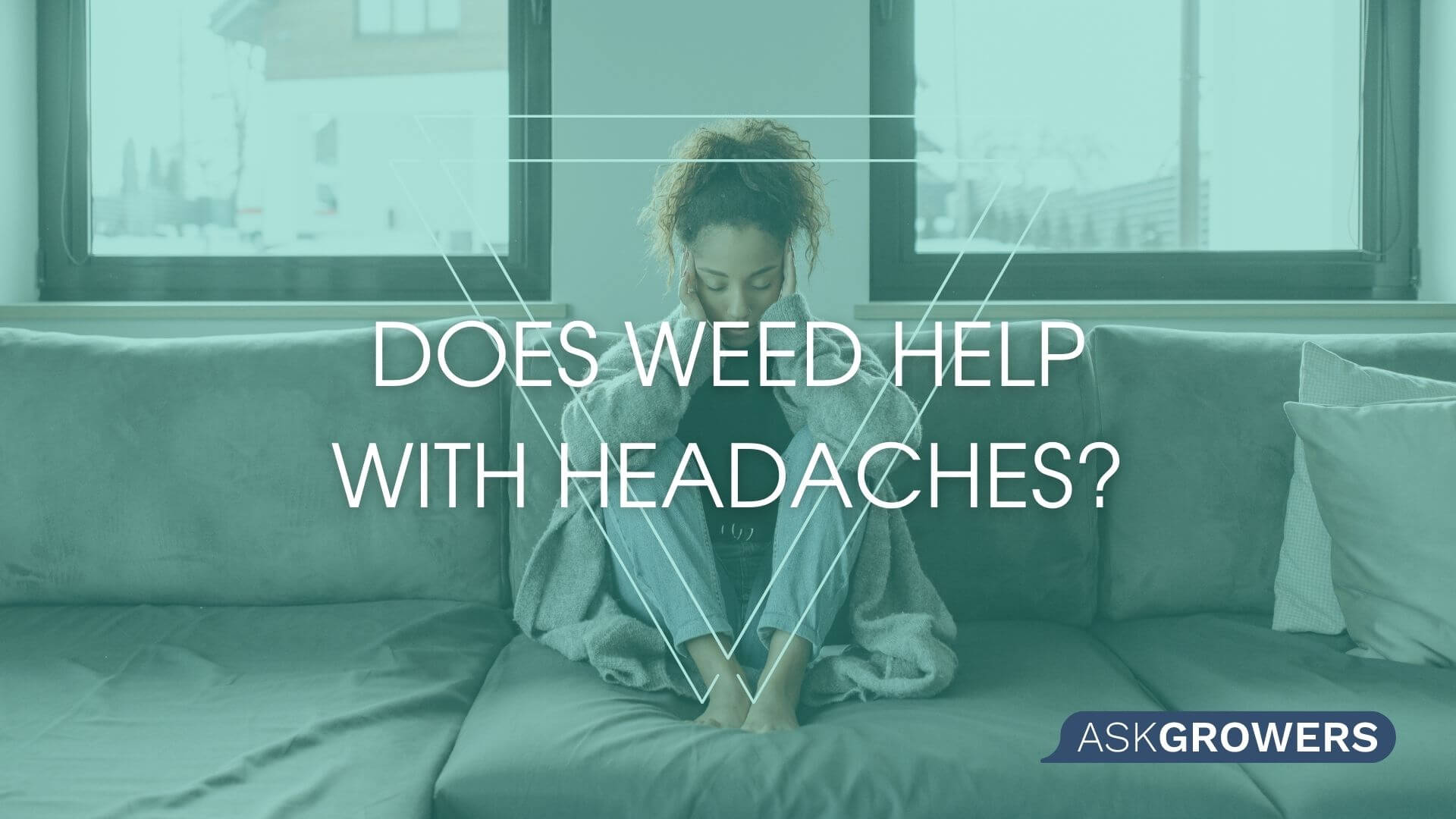






 (1).png)

.jpg)


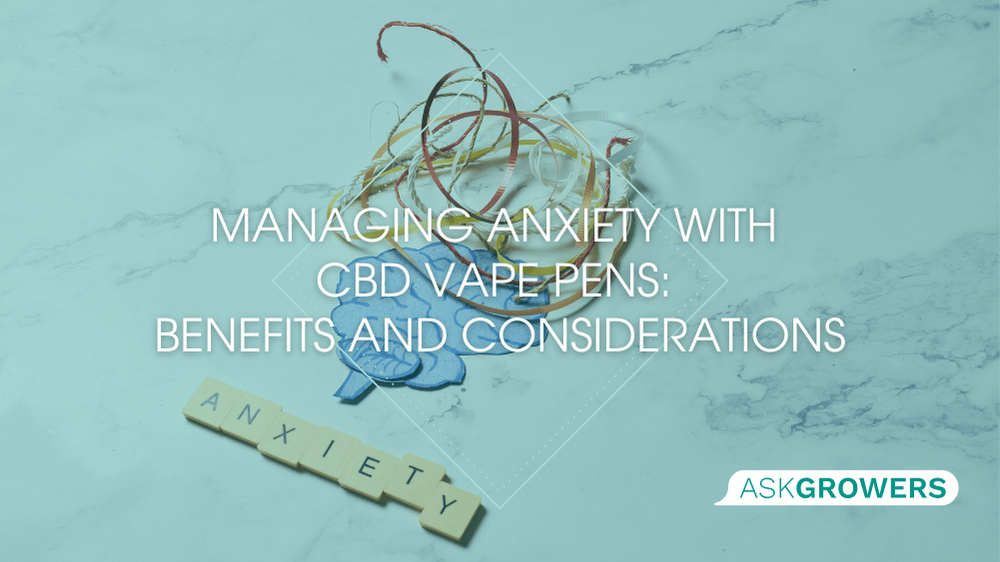
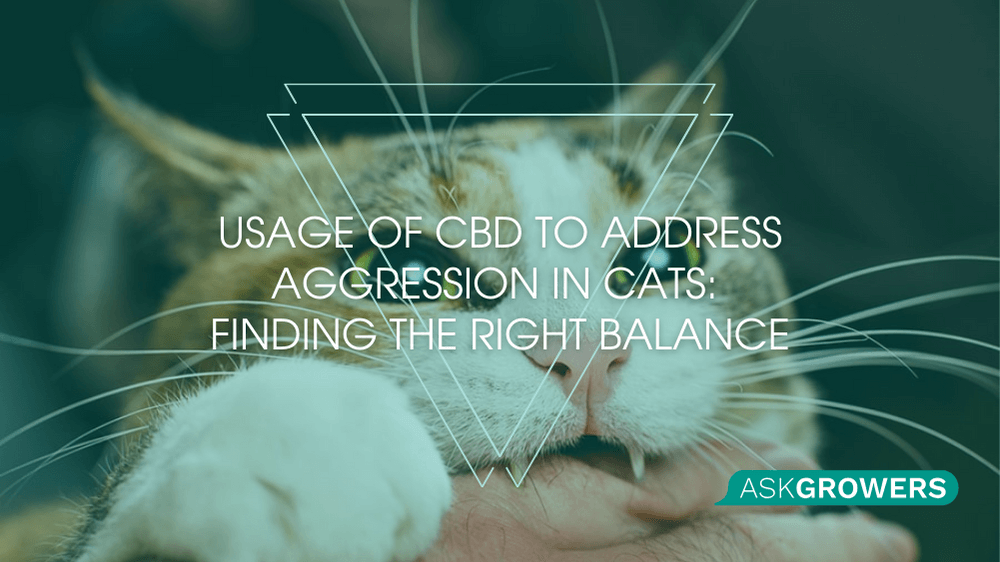

Be the first and share your opinion
Write a Review